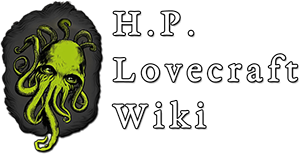
Arkham House's The Survivor and Others (1957), in which several of August Derleth's "posthumous collaborations" with H. P. Lovecraft first appeared.
![]() After H. P. Lovecraft's death, August Derleth wrote and published numerous stories under his own and Lovecraft's bylines, described as "posthumous collaborations". They were mostly based on story ideas from Lovecraft's Commonplace Book, and occasionally incorporated fragments written by Lovecraft, but overwhelmingly consisted of Derleth's own prose.
After H. P. Lovecraft's death, August Derleth wrote and published numerous stories under his own and Lovecraft's bylines, described as "posthumous collaborations". They were mostly based on story ideas from Lovecraft's Commonplace Book, and occasionally incorporated fragments written by Lovecraft, but overwhelmingly consisted of Derleth's own prose.
Lovecraft scholar S. T. Joshi commented:
| “ | These sixteen stories, listed as by “H.P. Lovecraft and August Derleth,” were in fact written almost entirely by Derleth. In most cases, the stories were based on one or more ideas noted in Lovecraft’s Commonplace Book; for example, “The Fisherman of Falcon Point” was based on this entry: “Fisherman casts his net into the sea by moonlight—what he finds.” Plotting, description, dialogue, characterization, and other elements were entirely by Derleth. As such they cannot be classified as works by Lovecraft. | „ |
| “ | In some instances Derleth incorporated actual prose passages by Lovecraft into his stories. The Lurker at the Threshold (a 50,000-word novel) contains about 1,200 words by Lovecraft, most of it taken from a fragment entitled “Of Evill Sorceries Done in New England” (see B-i-42), the balance from a fragment now titled “The Rose Window” (see B-ii-322). “The Survivor” was based on a comparatively lengthy plot sketch plus random notes for the story jotted down by Lovecraft in 1934. A descriptive passage of “The Lamp of Alhazred” was based on a portion of a letter by Lovecraft to Derleth, 18 November 1936. These extracts or paraphrases, however, have not been deemed significant enough to merit inclusion in this bibliography. | „ |
The Sixteen Stories[]
The 16 stories S. T. Joshi has separated apart, which have been in the past uncritically attributed to both Derleth and Lovecraft as co-authors, or even to Lovecraft alone, are
- The Lurker at the Threshold (1945)
- "The Survivor" (1954)
- "The Ancestor" (1957)
- "The Gable Window" (1957)
- "The Lamp of Alhazred" (1957)
- "The Peabody Heritage" (1957)
- "The Shadow Out of Space" (1957)
- "Wentworth's Day" (1957)
- "The Fisherman of Falcon Point" (1959)
- "The Shuttered Room" (1959)
- "Witches' Hollow" (1962)
- "The Shadow in the Attic" (1964)
- "The Dark Brotherhood" (1966)
- "The Horror from the Middle Span" (1974)
- "Innsmouth Clay" (1974)
- "The Watchers Out of Time" (1974)
S. T. Joshi's scholarship confirmed what was known privately for many years, that none of the above works are by H. P. Lovecraft. All of them are properly to be considered works of August Derleth.
This has no relevancy to any criticism or praise of the stories on their merits; this is a matter entirely related to authorship.
